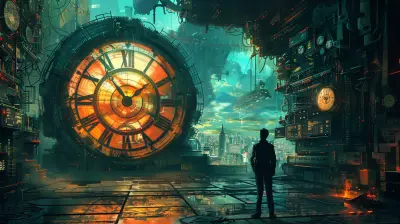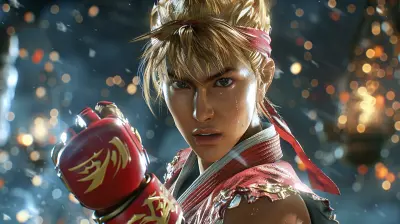Tales of Morality: How Fantasy RPGs Examine Right and Wrong
19 July 2025
Let’s face it—morality is a messy business. In real life, it's rarely black and white. But in the world of fantasy RPGs, morality becomes the heart of the story, the soul of the journey, the invisible force guiding every sword swing, dialogue choice, and allegiance. From the moment you create your character, RPGs ask, “What kind of person are you going to be?”
And the beauty is—you get to answer.
In this article, we’re diving deep into how fantasy role-playing games (RPGs) don’t just entertain us with dragons and dungeons—but actually make us think about what’s right, what’s wrong, and everything in between.
Why Morality Matters in RPGs
At their core, RPGs are about choices. Storylines branch out, characters react differently, and even the world itself can change—all depending on how you choose to act. But it’s more than just picking the “good” or “evil” dialogue option. It’s about understanding what kind of hero—or antihero—you want to become.Games like The Witcher 3 and Dragon Age don’t hand you clear-cut moral decisions. Nope. They throw tough scenarios in your face: help one village but let another burn, betray a friend to save a kingdom, spare a monster who just wants to live. You’re constantly challenged to weigh consequences, not just pick labels.
So, what makes morality in RPGs so compelling?
Think of it this way: RPGs are moral sandboxes. They let you play with ethics without real-world consequences. They give you a safe space to wrestle with guilt, redemption, and justice—and maybe even learn something about yourself along the way.
The Hero’s Journey… With Grey Areas
You might start a fantasy RPG thinking you’ll play the noble knight. But somewhere down the line, when you're faced with saving your ally or completing the mission… well, things get complicated.Games like Mass Effect or Baldur’s Gate take the classic hero’s journey and add layers of personal conflict. You're not just fighting monsters—you're dealing with loyalty, sacrifice, and the weight of your own choices.
For example:
- In The Witcher 3, every monster-hunting contract comes with a backstory. Are you killing a beast or silencing a victim of injustice?- In Fable, your actions literally change your appearance. Help a poor villager? You earn a halo. Torch a town? Say hello to horns and red eyes.
It’s not just about defeating evil—it’s about defining what evil actually means.
Player Agency: Morality As Gameplay
Unlike movies or books, RPGs give you agency—the power to shape the story. And this turns morality into a gameplay mechanic. Your decisions impact relationships, quests, even the ending of the game.In Undertale, for example, you can complete the game without killing a single enemy. But the kicker? The game remembers everything. Choose violence, and future playthroughs carry that weight. It’s a haunting reminder that actions have consequences—even in a pixelated world.
Key takeaway?
Fantasy RPGs don’t tell you what’s right or wrong. They let you make that call, and then they make you live with it. That lingering guilt after a bad decision? That pride from making a tough but noble choice? That’s immersive storytelling at its finest.
Morality Isn’t Always About Good vs. Evil
We often think of morality as a simple scale—from saint to sinner, light side to dark side. But great RPGs blow that binary wide open.Take Tyranny, where you play as an enforcer of an evil empire. Your job? Impose law and order. But here’s the twist—you can choose how to enforce that evil. Do you rule with fear or forge peace through compromise? There’s no “good” path, only different shades of control.
Even better, look at Disco Elysium, a detective RPG where your morality is tied to your character's beliefs. You can be a communist cop, a fascist, a moralist, or something else entirely. The game doesn’t punish you for your ideology—it just lets you explore its consequences.
The point is:
RPGs show us that morality is more about perspective than absolutes. And that’s refreshingly honest, isn’t it?Companions and Morality: Mirrors to the Soul
Ever notice how your party members in RPGs react to your choices like they’ve got moral compasses of their own? That’s no accident. Game developers use companions to reflect and challenge your values.In Dragon Age: Origins, your relationships can crumble or deepen based on your decisions. Save the elves? Alistair might cheer. Side with the werewolves? He might walk away.
Why does this matter?
Companions make moral choices feel personal. They’re not just mechanical consequences—they’re emotional ones. You’re building trust, manipulating alliances, and trying to keep your crew happy while staying true to yourself. And that’s a delicate dance, just like real life.Morality and World-Building: When Ethics Shape the Universe
Fantasy worlds often mirror our own, but with higher stakes and bigger metaphors. Magic, politics, religion—they’re all tools for exploring human nature.In Pillars of Eternity, your reputation spreads across towns and factions. Your decisions ripple outward, changing how people treat you. Some games even have entire quests locked behind your moral choices.
And let’s not forget The Elder Scrolls series. Join the Dark Brotherhood or the Thieves Guild, and suddenly you’re not a hero—you’re operating in a moral underground. Alignment isn’t just a role-playing stat—it’s a lifestyle.
The result?
You get a world that feels alive, reactive, and deeply tied to the kind of character you are.Cultural Perspectives: When Morality Gets Complicated
Morality isn’t universal—it’s cultural. And the best RPGs acknowledge that.In Final Fantasy XIV, different races and regions have conflicting beliefs about right and wrong. What’s heroic to one faction might be unthinkable to another. The game doesn’t judge who’s right—it lets you experience those contradictions and make your own judgments.
This adds so much depth. It forces players to think critically, to step outside their worldview and consider moral relativism. Not everything is about being “the good guy”—sometimes it’s about understanding other people’s truths.
Morality as Emotional Impact: The Choices That Haunt Us
Ever finish a game and still feel a knot in your stomach thinking about that one decision?Yeah. That’s the brilliance of morality in RPGs.
Maybe you let a character die to save the mission. Or sided with the villain to achieve peace. These aren’t just plot points—they’re emotional scars. And they stick with you because you weren’t just watching the story—you were a part of it.
Games like Spec Ops: The Line go even further, forcing you to confront the horrors of your actions. While not a fantasy RPG per se, it borrows the mechanics of moral choice and turns them against you—asking why you even felt justified in the first place.
Bottom line?
When done right, morality in RPGs isn’t just gameplay—it’s emotional storytelling. It’s raw. It’s real. And it lasts.Why We Love Moral Dilemmas in Fantasy RPGs
So... why does this resonate so deeply?Because fantasy gives us distance. It creates a world separate from our own, but still close enough to reflect it. That distance lets us engage with tough topics—slavery, war, discrimination, justice—without the baggage of reality.
And when we make those decisions, we learn. Not just about the game world, but about ourselves. Our instincts, our principles, our empathy.
In this way, fantasy RPGs become moral playgrounds. Not to escape reality, but to confront it—from angles we might never have considered.
Final Thoughts: The Line Between Player and Character
Fantasy RPGs aren’t just about winning or leveling up. They’re about living out different lives, making tough choices, and reflecting on who we are—or who we want to be.Sure, you can power through quests, min-max your stats, and go full chaotic evil just to see what happens. But chances are, somewhere along the way, a choice will hit you right in the feels. And that’s where the magic happens.
Because in the end, fantasy RPGs don’t just tell tales of morality. They ask us to write our own.
all images in this post were generated using AI tools
Category:
Fantasy RpgsAuthor:

Jack McKinstry
Discussion
rate this article
2 comments
Pierce Pope
This article beautifully captures the intricate relationship between morality and choice in fantasy RPGs. It's fascinating how these games challenge players to navigate complex ethical dilemmas, often mirroring real-life issues. I appreciate the depth and thoughtfulness you brought to this exploration of moral decision-making in gaming.
December 6, 2025 at 3:40 PM

Jack McKinstry
Thank you for your thoughtful comment! I'm glad you found the exploration of morality and choice in fantasy RPGs resonant and insightful.
Colton Underwood
In realms where choices weave the fates, Heroes tread on moral plates. With every quest, a heart laid bare, What is just, what is despair? Through magic's lens, we find our way, In fantasy’s embrace, we sway. Moral tales in pixels gleam, Shaping dreams, we dare to dream.
July 29, 2025 at 2:46 PM

Jack McKinstry
Thank you for your beautiful reflection! You capture the essence of how fantasy RPGs challenge our moral compass and illuminate the complexity of choice in our journeys.


